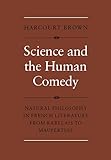Science and the Human Comedy : Natural Philosophy in French Literature from Rabelais to Maupertuis / Harcourt Brown.
Material type: TextSeries: University of Toronto Romance SeriesPublisher: Toronto : University of Toronto Press, [1976]Copyright date: ©1976Description: 1 online resource (244 p.)Content type:
TextSeries: University of Toronto Romance SeriesPublisher: Toronto : University of Toronto Press, [1976]Copyright date: ©1976Description: 1 online resource (244 p.)Content type: - 9781442651500
- 9781442632608
- 840/.9/38
- PQ142
- online - DeGruyter
| Item type | Current library | Call number | URL | Status | Notes | Barcode | |
|---|---|---|---|---|---|---|---|
 eBook
eBook
|
Biblioteca "Angelicum" Pont. Univ. S.Tommaso d'Aquino Nuvola online | online - DeGruyter (Browse shelf(Opens below)) | Online access | Not for loan (Accesso limitato) | Accesso per gli utenti autorizzati / Access for authorized users | (dgr)9781442632608 |
Browsing Biblioteca "Angelicum" Pont. Univ. S.Tommaso d'Aquino shelves, Shelving location: Nuvola online Close shelf browser (Hides shelf browser)

|

|

|

|

|

|

|
||
| online - DeGruyter In Search of Chaucer / | online - DeGruyter Rhythm in the Novel / | online - DeGruyter Action / | online - DeGruyter Science and the Human Comedy : Natural Philosophy in French Literature from Rabelais to Maupertuis / | online - DeGruyter My Lady of the Snows / | online - DeGruyter The Judicial Committee and the British North America Act : An Analysis of the Interpretative Scheme for the Distribution of Legislative Powers / | online - DeGruyter The Phonological Interpretation of Ancient Greek : A Pandialectal Analysis / |
restricted access online access with authorization star
http://purl.org/coar/access_right/c_16ec
New scientific theories, methods, and objectives exert subtle and often unnoticed influences on literary creation. The developments of the attitudes and aspirations of French scientists between the Renaissance and the Revolution and the impact of these new outlooks on French literature form the theme of this book by an authority in the interdisciplinary treatment of science and literature. Implicit in the author's exploration is the view that in the development of the scientific revolution there was no overall design, but rather random growth; human beings turn up at various moments, some of them appropriately, some of them not, so that the record is in part a story of successful endeavour, in part a comedy little short of farce. in the historical panorama of this book, four auhors, each known for his ironic, even comic, insight into the human condition, are chosen to illustrate the theme. As men of letters, Rabelais and Voltaire exhibit well-defined scientific interests, while Pascal and Maupertuis were drawn from their scientific vocations into the discussion of ideas in literary forms. Consideration of their similarities and differences suggested the title, Science and the Human Comedy. This work is a valuable contribution to our understanding of the historical and cultural conditions accompanying the advancement of science in a critical period, as well as of several ways in which the process was reflected, sometimes directly, more often indirectly, in literature. (University of Toronto Romance Series 30)
Mode of access: Internet via World Wide Web.
In English.
Description based on online resource; title from PDF title page (publisher's Web site, viewed 01. Nov 2023)


